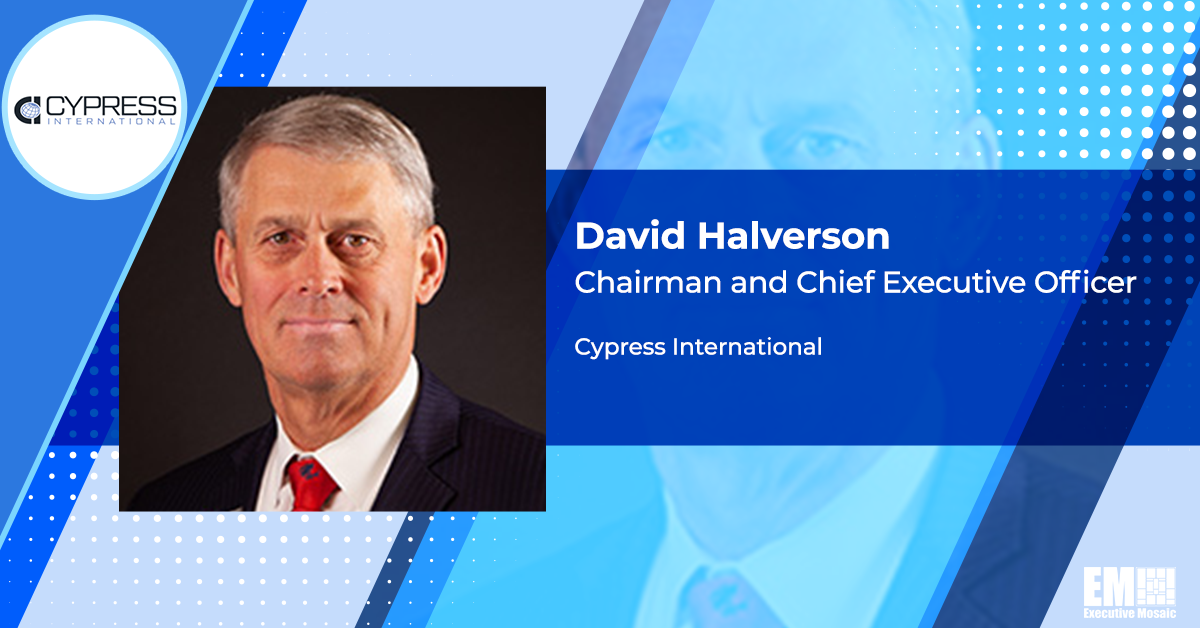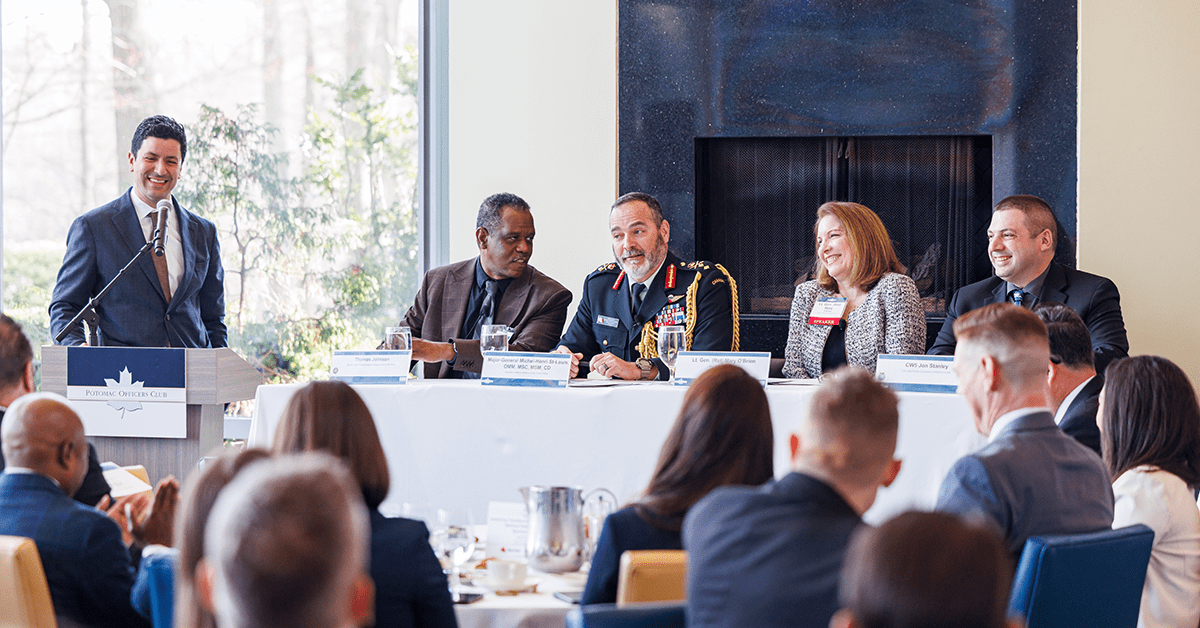In today’s particularly complex and competitive geopolitical environment, the United States is reinvigorating its commitment to advancements in critical defense priority areas. New warfighter capabilities are being enabled by technologies like artificial intelligence, microelectronics and others, but the U.S. must accelerate investments in these areas in order to outpace competitors.
David Halverson, CEO and chairman of Cypress International, spoke with GovCon Wire to share his insights into the great power competition and the next era of warfighting capabilities. Halverson is an Army veteran and has been with Cypress International for over six years.
Read Halverson’s full Executive Spotlight interview below.
Tell me about Cypress International’s culture. What aspects of the company do you think are contributing most to its success while helping to attract and retain top-level talent?
I think culture is the most important thing. We’ve been around for almost 45 years. We’re a small, privately-owned company, and we’ve been able to adjust to the changes going on here in the greater D.C. area and nationally because of our culture. For us, it’s all about the people. We really look hard at the people we bring on. Those people have to be experts in their field, they have to be values-based, they have to be driven by excellence and they have to be self-motivated about trying to solve national security issues. That’s what we do.
The second thing about our culture is we really stress community payback. We integrate with the community locally, here in old town Alexandria, but then also globally by being on boards like the Army Aviation Association of America, the Field Artillery Association, NDIA and others that advocate for national security in America. So we want that payback, but we also want our folks to be community leaders and to be able to show what leadership is all about.
We are a company that has experts across all services, along with interagency capabilities, so we get to see things from a joint and combined approach. I’m the fifth chairman and CEO in Cypress International’s 45 years, and we’ve had some clients that have been with us over 40 years. We have these clients that have been with us for decades because we deliver on our commitments and we build trust. Our actions speak louder than our words.
What’s your outlook on the global defense landscape? What significant changes or trends are you seeing, and how are those factors moving the GovCon industry market?
Right now, global defense is very complex. Truthfully, it’s more complex now than ever before. We’re seeing this with Ukraine, we’re seeing this with the China buildup, and we’re seeing this with industrial base issues. It is very chaotic and fast-moving, and we have a lot of folks challenging us.
What is still the same about it is that we have outsourced a lot of our capability, so from a supply chain and national security perspective, we’ve really put ourselves at risk. I think we’re seeing some shifts and policies that focus on bringing some of the crucial industrial base back.
One example is microchips. We’re reliant on places like Taiwan or China for microchips, and that then can be a challenge to us as we focus on deterrence. Another example is strategic material where we are relying on off-shore mining and processing as a key component of many of our defense articles. Additionally, with the economic challenges of inflation, we’re understanding that even though we do have a big budget, our buying power has lessened because of the dependency. What we’re not looking at is the true buying power that we have in the defense market.
The most important trend I’m seeing is a fight for talent. Our defense industry needs a lot of engineers, a lot of production people and a lot of project management people. I think talent management itself is a challenge. And then, how do you get people excited to be an engineer? How do you get people excited to come into the defense and go through security clearances? I think the ‘war on talent’ is going to be something that we have to continue to support and facilitate.
If we’re losing ground in any critical national defense priorities, how are we working now to catch up?
I think America is the most innovative country in the world, but we’ve been too trusting on some things. We’re not so much losing ground, but we have to really refocus the energy of America on some of the defense priorities. I think Heidi Shyu has done a good job of laying out the things that we need, like artificial intelligence, microchips and bringing energetics back to America. Capitalism’s reliance toward globalization needs to be scrutinized for the sake of our national security. Our adversaries enjoy state-owned enterprises supporting their industrial defense complex.
We have to exploit a mission command system where we don’t have to reinvent everything, but we need to have any shooter, any sensor be able to contribute to the architecture and to make the best decisions that we can. We are working our priorities and what we have to be able to do. Some of the other critical defense priorities are assured PNT, long-range fires, nuclear delivery capabilities and mission command. Those are really vital priorities that we’ve got to continue to push because they can change the ecosystem and our balance in competition.
Where are you seeing the most exciting opportunities to deliver better capabilities to our warfighters today, and how are you harnessing these opportunities?
Some of the most exciting opportunities we see revolve around JADC2 and connecting any sensor, any shooter. I think the blending of commercial into military architecture is very exciting because time is our most precious resource. And in decision, the lag of two or three seconds can mean a lot. Like I said earlier, we’re in competition right now, be it in the cyber domain, space domain and other domains. So as that plays out, if we can get the architecture right, we can avoid investing too much and then having to integrate capabilities from a joint perspective. That’s really a game changer.
Another thing is precision. With the Ukraine conflict going on, we’ve seen that precision can defeat mass. And that precision eliminates collateral damage, civilian deaths and more.
Energetics is another game changer. I’m excited about some of the aspects of our ability to go longer and more lethal, to ensure that we don’t put people in harm’s way. We’re breaking into the longer ranges, working together as a joint and combined team and bringing that collective capability for both offense and defensive. So how do we protect ourselves from what the enemy wants to do? I think those long-range precision fires, along with defensive capability — be it missile defense capability or hypersonic defense — are going to give the American people much more assurance on anything that does go wrong.
We also have to continue to exploit AI/ML. Data is so fast that the human mind at times becomes a hinder block. We have to have control measures set for it, but sorting through what we have to be able to do in the time delay and then to make a conscious decision is going to be very important. Using AI for that is going to be very important for us to harness and have trust in as we move forward with the electromagnetic spectrum.
Then lastly is space. Space is a new frontier that is going to give us assurance on oversight, overwatch, targeting and all of these means that we need to be able to deter the enemy.
Warfighters do not want to go to war. We believe in deterrence. I think that’s what’s important for us to think through from a Defense Department perspective. How do we give them that overmatch? How do we build that capability, not only a U.S. capability, but what we’re seeing with NATO and EU and the Pacific alliances — allies that believe in freedom.
What do you think is the number one lesson we can learn from the Russian invasion of Ukraine? What information have we gathered that will help the U.S. military to better prepare for and respond to future conflicts?
It’s a complex question because we’re still learning lessons. But one lesson learned is that we have to be prepared for potential conflict. We do not control when our enemies provoke action. What are we going to do? Do we have the strength? Have we invested properly to deter, and do we have the will to use it?
This conflict is showing the fragility that we have. It has awoken everyone, and I think now we’ve seen some of the things that we need to fix. We as a nation need to really work together along with our alliances to collectively build that capability to deter and defeat. It also shows that new technologies are changing the character of war. Commercial technologies are driving change in ‘how war is fought’ in areas like AI/ML, weaponized drones, cyber and decision-making awareness.
It also shows that leadership matters. Ukraine’s president is standing up and fighting for freedom, fighting for his people and doing great work.






